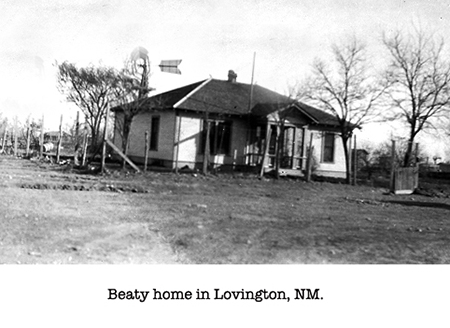Roosevelt County
It was September 1934, that I started work in Roosevelt County. As the children were already enrolled in the Lovington school, we decided not to move to Portales until the next June. I rented a room in Portales and drove back and forth weekends from Portales to Lovington. Orren, Jr. was a senior and wanted to graduate with the class he had been with the four years, which was another reason for our keeping our home in Lovington.

The work in Roosevelt County was the same as it was in Lea County. The cattle- and sheep-buying program was still in process and took up most of my time the first three months. There were many more farms in Roosevelt County and I was not familiar with them, so it was a much harder job routing the teams who were buying and notifying the farmers and ranchmen when to have their stock in corrals when the buying crew arrived. There were over 45,000 head of cattle purchased and several thousand sheep.
The last day of the buying program was a busy day and over a thousand head of cattle were brought to the stock pens south of Portales. In order to keep all records straight, I decided to keep all records of owners selling and the number of cows each farmer sold. It was during the Dust Bowl days, and that day was one of the dustiest days with dust so bad you could hardly see. How I managed to keep all the records straight I don't know, but no complaints came in so they must have been correct.
There was a considerable number of 4-H Clubs in the county and also the cotton, peanuts and other control programs going on in the county. In order not to neglect them, the Extension Service sent Bernard Love to the county to assist in the work. We were both kept very busy looking after the different projects and taking care of the regular work.
We ran contours on several farms for terracing and assisted them in terracing the land. We also assisted the County Commissioners in the Welfare work in the county. Because of the drought, feed was scarce and the government supplied feed to a good many farmers.
The next spring, the government put on a program to help keep the land from blowing away. George Quesenberry was sent in to direct the work. He had several crews running levels on the farms so the land could be terraced and crops planted on that level. Also, they were to strip plant their crops so that corn, broomcorn, grain and sweet sorghums would form a barrier to keep the soil from blowing on land planted to beans, cotton and vegetables. We assisted in this work also.
Then the Rural Rehabilitation Program was started and Field Thompson was sent to Roosevelt County as Supervisor for the county. He wanted me to OK plans for farmers for loans. I visited as many of his clients as I could and advised him as to whether the loans were needed and if the farm program was OK. After school was out in Lovington and commencement over, we moved to Portales. Erma had taught the past year in the Portales school and when we moved there, she came and stayed with us until we left Portales the next June.
When the Depression started in the U.S., the government cut our salaries and I was out $400 a year. When the government started a large number of projects, they hired a County Agent and other workers at a larger salary than we were getting. At our Extension Conference in January, we agents asked that our salaries be reinstated but the Regents of the College took no action. Then a committee of myself and two other agents called on the Governor of New Mexico and laid our case before him. Arthur Seligman was the Governor and he said he was with us and suggested we meet with the Board of Regents and lay our case before them. We did and I presented our case and told them the Governor had suggested that we meet with them as he thought we were entitled to a raise.
The Board was very independent and said they were not "yes" men and that the Governor could not dictate to them. I told them that I would not show up on the job but would take the first job offered to me if it was for a better salary.
That fall, Field Thompson was sent from the Rural Rehabilitation Program to ask me to take a job as District Supervisor at a salary of $3,000 a year. I resigned my job as County Agent and accepted.